
Decorative silverplate was a staple in Victorian households of the 19th century, and popular into the 20th century. It describes flatware and hollowware with an electroplated outer layer of silver on a base metal, usually nickel or copper. Quite functional and good-looking, silverplate was produced in a wide range of styles and designs, and might be found in every room.
Nicole Mullen and Daniel Calderon, curators at the San Francisco Airport Museum, recently mounted a fascinating exhibition of Victorian silverplate, giving us a tantalizing glimpse into the beauty of its design. We asked the Museum’s talented conservator Alisa Eagleston–Cieslewicz how to clean and polish silverplate properly. Her guidelines follow.
1. Examine Carefully
The first step, Alisa explains, is to take a good look at the piece and decide if it truly needs polishing—or not. Every time a piece is polished, a little bit of the surface silver is removed. This wears down engraving or surface details, and may eventually wear down the plating layer.
2. Make a Plan
Next, assess the piece to identify any problem areas: plate lifting, structural issues such as dents or loose components, pitting, old coatings, hollows, or detachable areas. Look for moisture-sensitive components—wood, ivory, or perhaps textiles, such a those lining jewelry caskets—to plan how to avoid contact between these materials and the metal-polishing compound. See if the area can be unscrewed or removed; otherwise, try to slip a thin plastic sheet between the metal and adjacent material. Don’t use tape, as this may damage surfaces.
هذه القصة مأخوذة من طبعة November - December 2021 من Old House Journal.
ابدأ النسخة التجريبية المجانية من Magzter GOLD لمدة 7 أيام للوصول إلى آلاف القصص المتميزة المنسقة وأكثر من 9,000 مجلة وصحيفة.
بالفعل مشترك ? تسجيل الدخول
هذه القصة مأخوذة من طبعة November - December 2021 من Old House Journal.
ابدأ النسخة التجريبية المجانية من Magzter GOLD لمدة 7 أيام للوصول إلى آلاف القصص المتميزة المنسقة وأكثر من 9,000 مجلة وصحيفة.
بالفعل مشترك? تسجيل الدخول

Navigating the Lumberyard - Here's some lumber lingo you should know before you venture into a lumberyard.
Here's some lumber lingo you should know before you venture into a lumberyard. Almost everyone fixing an old house will end up at a lumberyard-whether it's a local supplier or the organized aisles of a big-box home-improvement store.

a farmhouse renewed
Sensitive renovations and restoration work preserved a house that dates to 1799.
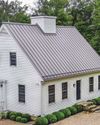
AN OVERVIEW OF METAL ROOFING
METAL ROOFS ARE RESURGENT, FOR GOOD REASONS.
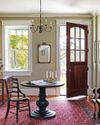
ENDURING BEAUTY IN WALLS of STONE
Now back in the family who had been here since 1830, the old farmhouse is again ready for generations to come. Additions dating to 1840 and the 1950s were preserved.

ARCHITECTURAL DETAILS COME TO LIFE
Owners and their designer celebrate the unique features of a 1912 Arts & Crafts Tudor.
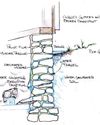
For a Wet Basement Wall
If there's problem common to old houses, it's a wet basement. I'm not talking about occasional flooding, but rather a basement that apparently seeps or leaks after even a rain shower or during snowmelt. Several approaches are available; sustainable solutions will get to the root of the problem.
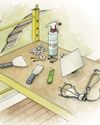
Patching a Plaster Wall
Fix a hole in the wall with a few common tools and some drywall supplies. Practice your technique!
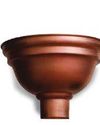
Roofing & Siding
Make note of these historical and unusual materials for the building envelope.

The Riddle of the water
When water incursion happens, the roof isn't necessarily the culprit. Maybe snaking a drain line, or clearing debris from a clogged gutter, temporarily will stem a leak. But a recurring problem usually means other forces are at work. It takes persistence-and a team with the right skills and patience—to identify the source and apply a solution.

Light-filled Craftsman Redo
For a dark kitchen in a 1914 Illinois house, the trick was anchoring white expanses with woodsy warmth.